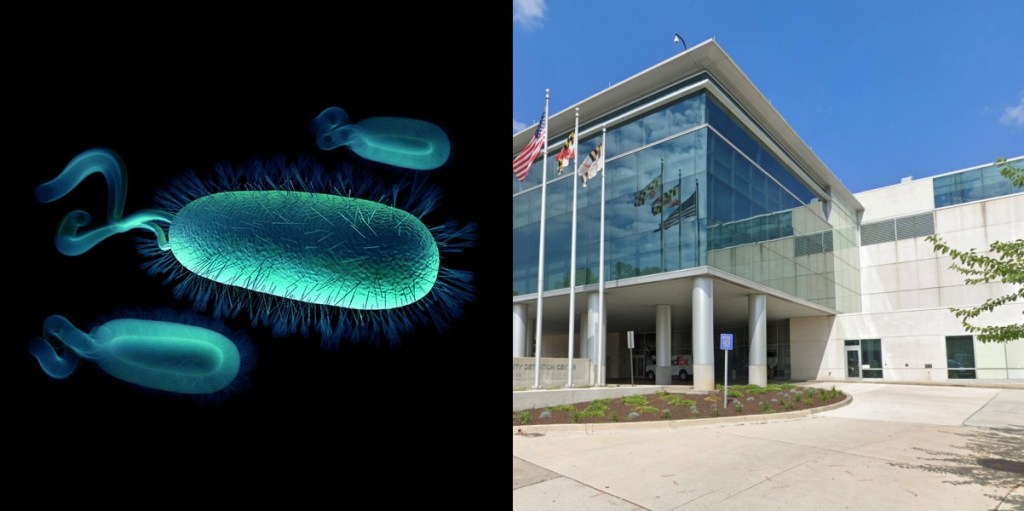By Alexis Taylor
AFRO Managing Editor
Inmates at the Baltimore County Detention Center in Towson, Md. allege bacteria in water being used to cook, clean and shower is the source of rampant infection on Tier 4H.
Joseph Church, 53, spoke with the AFRO in a phone interview on Nov. 30, alleging that dozens of inmates are experiencing symptoms due to exposure to the bacteria, identified as H. pylori.
“We need some kind of help here,” said Church. “They don’t care. I put in a sick call last Wednesday. I’ve been peeing blood…I’ve got stomach cramps, head pain. I went to medical and I was told I had to ‘wait my turn,’ but it’s been over a week.”

According to information released by Johns Hopkins Medicine, “Helicobacter pylori (H. pylori) is a type of bacteria that infects your stomach. It can damage the tissue in your stomach and the first part of your small intestine (the duodenum). This can cause pain and inflammation. In some cases, it can also cause painful sores called peptic ulcers in your upper digestive tract.”
The Mayo Clinic reports that “H. pylori bacteria are usually passed from person to person through direct contact with saliva, vomit or stool. H. pylori may also be spread through contaminated food or water.”
Church, who has been an inmate for 10 months, said he believes substandard plumbing has allowed the bacteria to spread through the older parts of the facility at 720 Bosley Avenue in Baltimore County.
He alleges that pipes “sitting outside sitting against the wall,” gave the inmates the impression that something would be done about the plumbing system, but they’ve been sitting outside for months. While the public can’t see the pipes, those on the inside say they can see the materials laying on the grounds of the property. Meanwhile, inmates say they continue to get sick.
“The health department needs to be called. When somebody takes a ‘number two’ in a cell, it goes into the next cell,” he said.
“If you put a white cloth under the water the cloth will turn brown,” Church alleges. “That’s how bad the water is here. I just want someone from the outside to step in and try to help.”
Ronald Meyers, 53, says he tested positive for H. pylori by staff in the medical office of the detention center. His symptoms began around the beginning of September, but he didn’t get tested until months later, when word of the bacteria and signs of infection began to ravage the tier.
“I had blood in my poop, blood in my urine. I kept on having gas– even when I wasn’t eating food,” said Meyers.
“They did the test about three weeks ago,” said Meyers. “After, they told me I was positive they started giving me medication.”
Inmates who test positive say they have been given a cocktail of drugs and a regimen that lasts well into 2025. Those who test positive– and at least one man who was deemed infected based on symptoms– are given amoxicillin and levaquin for two weeks and a year-long prescription for Prilosec, administered twice a day.

But the inmates say simply treating the symptoms– not the source of the exposure– isn’t enough.
The allegations coming from the Baltimore County Department of Corrections echo complaints from inmates across the country, who say their living conditions cross the line when it comes to “inhumane treatment” while they serve their time.
According to the Prison Policy Initiative, “people face extremely poor living conditions in practically every jail and prison, which negatively impacts their odds of success upon release, their families, and public health at large.”
The institute reports that “routine failure to provide for the medical needs of incarcerated people is harmful (even deadly) for those inside, and strains family resources and healthcare infrastructure after they’re released — and nearly everyone will eventually be released.”
While many Americans view the imprisoned as “less than” in society, many also believe inmates still deserve to serve their time in a facility that does not cause infection.
“We’re all human,” said Cameron Phillpots, an inmate in Baltimore County since July 22. “Everybody isn’t innocent, but we should still be treated like humans,” said the 18 year old.
“I first started experiencing symptoms around September. When I used the bathroom I was seeing blood. I was vomiting a lot, and I didn’t have an appetite for real,” said the teenager. “I was feeling light headed. I was going through a lot of symptoms, but I didn’t know it was to be honest. A lot of people had the same symptoms, so I put in the sick call and they came down to the tier.”
Phillpots says his blood pressure was checked and his body was weighed in his initial visit with the facility’s medical professionals, but no blood was taken to see if he was infected.
To date, Dec. 1, he still has not been tested for the bacteria.
“They said they would come back and test me for H.pylori, but they never came back, so I put in another sick call,” said Phillpots. “Normally, if you hurt yourself or ask to go to medical and tell them your symptoms they are going to come and get you the same day or two days later. I feel like they have something to hide- they don’t want to prove that I have it.”
“In my opinion, they’re trying to just throw it under the rug,” he said.
That sentiment was expressed repeatedly as sick inmates lined up to speak with the AFRO via phone.
Cameron Coates, a 25-year-old man from West Baltimore’s Sandtown community, says he believes a medical official tried to keep his positive results quiet.
“I got tested and the lady that works in the doctors office told me I tested negative,” said Coates. “They don’t give you your results–you have to request them. When I got my result, it said I was positive.”
Coates said in a medical appointment for an unrelated matter, he asked the woman who tested him why she lied about his results.
“She swore it wasn’t her,” he said.
Coates alleges he then asked the woman why she didn’t simply put in an order to treat him with medication as soon as she saw he was positive. In her defense, the woman allegedly told Coates she did– which, unwittingly, confirmed for him that he was speaking to the same woman who tested him and saw he was positive.
Many inmates expressed feelings of helplessness when it comes to avoiding the infection, as water from the faucets available is used to prepare food, wash and clean.
Mark Goinges, 26, spent 18 months in the facility between June 2023 and August 2024. After two months on the outside, he has returned. In his previous stint, it took six months before he started feeling sick. At the time, he wasn’t tested- he was just put on medication.
“Now that I’m back, it’s worse,” he said. “They tell you not to drink the water– the water’s contaminated- but you don’t have a choice to not drink the water.”
Xavier Nettles, a 24-year-old from East Baltimore, said he tested positive for H.pylori on Oct. 4.
He read from his medical documents in his phone interview.
“On here, it says if it’s over .99 it’s positive,” he said. “Under ‘summary,’ it says my H.pylori results are ‘1.42 H.’”
“They gave me antibiotics and medicine to take. They give it to me every morning and every night, but a week ago I was throwing up blood. My mother told me it’s probably the lining in my stomach. I don’t think you’re supposed to throw up blood.”
Inmates living on the “old side” of the Baltimore County Department of Corrections, along Kenilworth Drive, say the deplorable conditions must be addressed, or inmates will continue to get sick.
“In the cell next to me- if he pees or poops, everything he flushes ends up in my toilet,” said Nettles. “This jail shouldn’t even be open- it should be closed down.”
The AFRO reached out to the Baltimore County Department of Corrections via email and phone and did not receive a response.
The post Baltimore County inmates say bacterial infections linked to contaminated water appeared first on AFRO American Newspapers.











